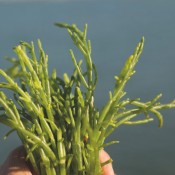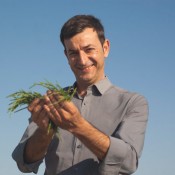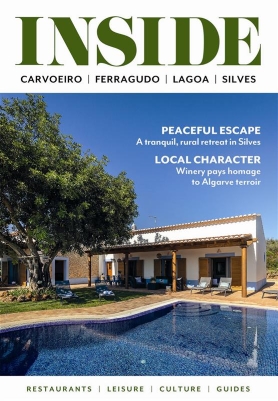

Introducing a little-known Ria Formosa culinary delicacy
The first samples of a little known, yet deliciously salty plant are currently being harvested in Ria Formosa. Salicornia (whose common names range from marsh samphire to glasswort and pickleweed) is tickling the tastebuds of many of Algarve’s chefs.
Miguel Salazar, the CEO of start-up company ‘RiaFresh’, is not surprised. No stranger to the Portuguese gourmet scene himself, Salazar – a Spaniard living in the Algarve for 13 years – believes Ria Formosa’s variety is in a class of its own.
Although Salicornia grows naturally from Wales to the Algarve coast, it is “a very complex plant,” the head of RiaFresh told us, “with a taste that varies “immensely” from area to area.
“Even botanists have difficulty identifying the many varieties that exist,” the 43-year-old with a PhD in agronomic engineering admitted.
“Historically, we were told there were four basic taste receptors: sweet, sour, bitter and salty,” he explained. “But some years ago in Japan, a fifth was identified, in the central part of the tongue. It involves the reaction of chemical components that increase the palate.”
One of the characteristics of salicornia is a savoury taste known as “umami” – a Japanese word meaning “delicious”. It is the “umami” of salicornia that acts as a natural flavour booster. “Its texture, structure and morphology make it a very special finishing touch to many dishes. It is also a natural and healthy salt substitute.”
RiaFresh developed as a result of research work conducted by mother-company Agro-On between 2011 and 2014 at Castro Marim’s Reserva Natural do Sapal.
The research was designed to sustainably produce halophytes – plants that grow in or near salty water. Based in Faro, Agro-On has worked on many quality control food projects around the world.
The start-up company is growing its first plants in a controlled environment, echoing the “natural conditions of Ria Formosa”, not far from Faro’s University of the Algarve in Gambelas.
These custom-grown yet fragile plants are better protected from “extreme temperature changes, as well as other external factors” that could threaten quality standards, according to Salazar.
“In our case, we’re producing an indigenous eco-type known as Salicornia da Ria Formosa, which involves a ‘thorough selection’ of the plant’s tiny seeds.”
RiaFresh’s first seeds were planted last December and by the end of March, the plants were ready for harvesting, just short of maturity – and in their prime.
Salazar’s initial goal is to produce 300 to 500 kilos of Salicornia de Ria Formosa – enough to introduce this new Algarve delicacy to the region’s gourmet market and fine dining restaurants.
“For now, all we need is a small group of chefs to get creative,” Salazar declared, adding: “this far, we’ve had great feedback.”
The first batch is available in 30, 60 and 100-gram packages and can remain fresh for up to two weeks “if kept cool” – but the likelihood is that people will gobble it up in a blink of the eye.
Salazar is aiming to sell the delicacy at gourmet stores and selected outlets, “But for now, we run an online store where people can order it.”
RiaFresh isn’t content to limit itself to salicornia. It’s also planning to cultivate other vegetable species naturally found along the Ria.
“This is just the beginning”, revealed Salazar.
Text Bruno Filipe Pires












